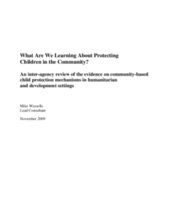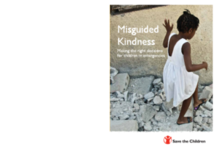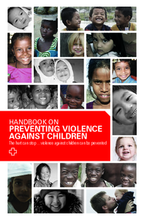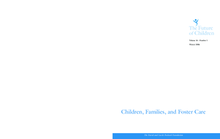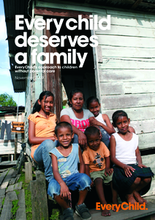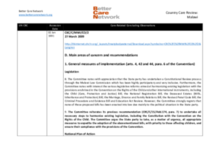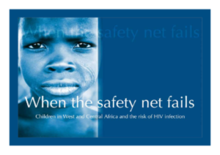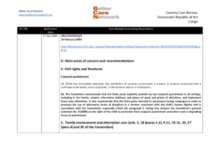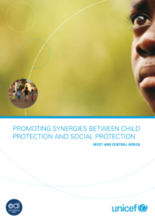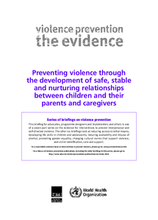Displaying 431 - 440 of 532
An interagency review of the available global evidence on community-based child protection mechanisms, their effectiveness, cost, scalability, sustainability and impact on children’s protection and wellbeing
Using lessons learnt in emergencies, from the genocide in Rwanda to the Asian Tsunami and the earthquake in Haiti, our new report, Misguided Kindness, demonstrates what action is needed to keep families together during crises and to bring separated children back into a safe and nurturing family life.
The Canadian Red Cross has produced a handbook on the prevention of violence against children. The handbook includes specific guidance on preventing violence against vulnerable children, such as children in institutions, children involved in armed conflict and children with disabilities.
Provides global estimates of the number of highly vulnerable children; a summary of United States Government (USG) assistance programs for highly vulnerable children; a summary of progress coordinating the response among USG agencies; key strategic issues and opportunities; priorities for 2009–2010 and beyond; and a summary of the results and achievements of USG assistance
This document outlines EveryChild’s approach to the growing problem of children without parental care by defining key concepts, analysing the nature and extent of the problem, exploring factors which place children at risk of losing parental care, and examining the impact of a loss of parental care on children’s rights.
This country care review includes the care-related Concluding Observations adopted by the Committee on the Rights of the Child.
Study investigating the psychosocial impact of different high risk situations in West and Central Africa such as trafficking, ethnic cleansing, armed conflict or parental loss.
This country care review includes the care-related Concluding Observations adopted by the Committee on the Rights of the Child.
Focuses on children’s vulnerabilities and risks related to an absence of protection from violence, abuse and neglect, and the ways in which measures to address such vulnerabilities and risks can be more effectively integrated into social protection policy frameworks in the West and Central Africa region.
This briefing looks at the effectiveness of interventions that encourage safe, stable and nurturing relationships for preventing child maltreatment and aggressive behaviour in childhood. The focus is on primary prevention programmes, those that are implemented early enough to avoid the development of violent behaviour such as child maltreatment and childhood aggression.

